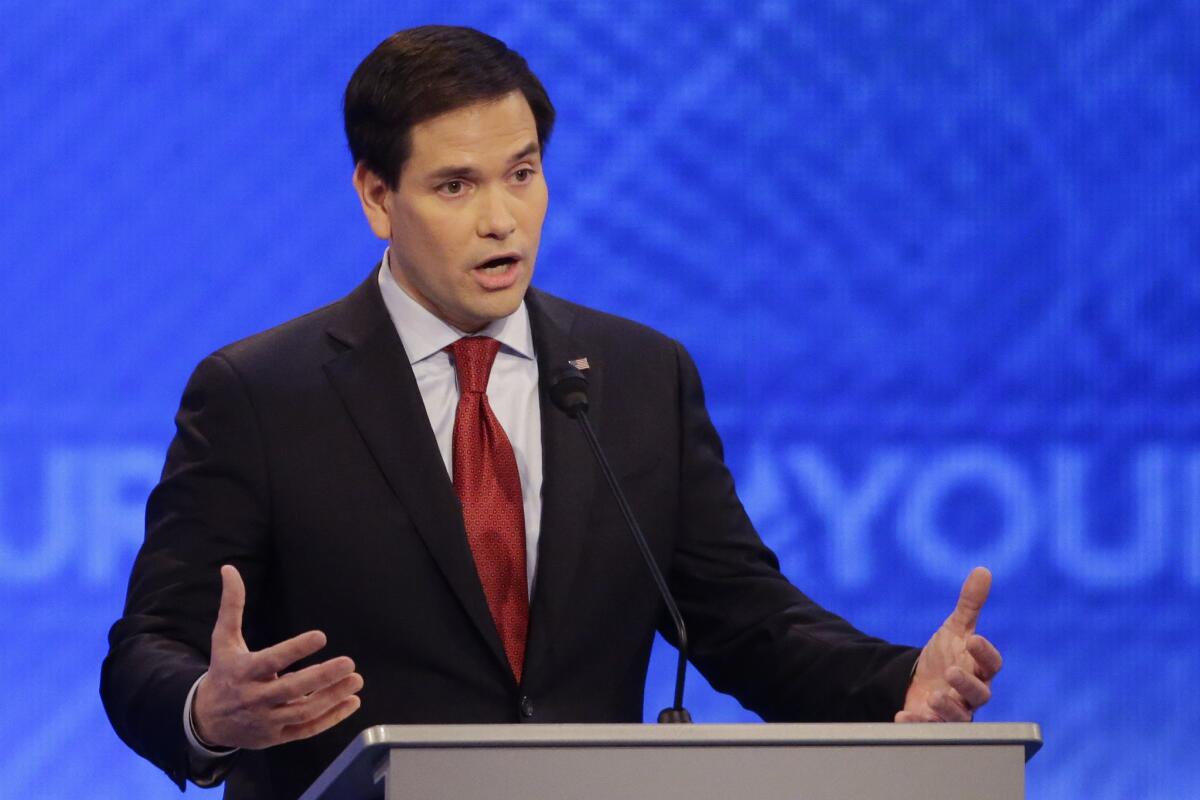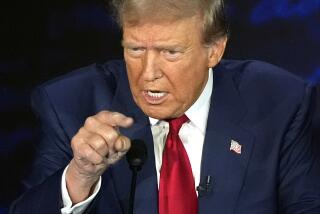Analysis: Rubio stumbles with help from Republican governors who have nothing to lose

Sen. Marco Rubio of Florida answers a question during the Republican presidential primary debate on Saturday at St. Anselm College in Manchester, N.H.
- Share via
Reporting from Manchester, N.H. — Their campaigns hanging in the balance, the Republican governors running for president struck back in Saturday’s debate, the last before New Hampshire votes on Tuesday. And Florida Sen. Marco Rubio was their primary victim.
Rubio entered the debate with momentum, having transformed his surprise third-place finish in last week’s Iowa caucuses into a surge in crowds, endorsements and polls here. For three governors who have been tightly packed with him behind Donald Trump and Texas Sen. Ted Cruz, Rubio’s success spelled an imminent demise, and they moved aggressively from the beginning of the Manchester debate to undermine him.
If they are rewarded by higher standing come Tuesday — and especially if Rubio’s momentum is stalled — then the struggling candidates will have won deathbed reprieves. And the Republican race for president probably will be headed for an extended and rancorous battle, rather than the quick consolidation behind an establishment favorite that many party strategists have hoped for.
Before Saturday, New Hampshire polls consistently have found Trump far ahead and recently have had Rubio gaining ground behind him, with the governors trailing. But New Hampshire is notorious for last-minute flips, so all of the candidates were aiming at the huge chunk of the electorate here that is either undecided or willing to change its mind.
It was New Jersey’s Chris Christie — the weakest of the governors, at least in polls — who struck first, brutalizing Rubio on his preparedness for the White House, then later adding attacks on his views toward Muslims and, time and again, his immigration position.
Rubio grew so rattled early on that four times he repeated the same line about President Obama knowing exactly what he was doing — in Rubio’s construction, weakening America by making it more like every other country. The line is one Rubio has used before, part of his defense against the charge that the GOP should not pick an inexperienced first-term senator as its nominee the way the Democrats did in 2008. Obama’s inexperience isn’t the problem, he argues.
But the utterance of the same phrase four times over a short span of time made Rubio appear to be mouthing talking points, as Christie was happy to point out.
“There it is. There it is. The memorized 25-second speech,” Christie said after the third rendition. “There it is, everybody.” And then Rubio repeated it again.
By midway through the debate, Rubio was sweating visibly, wiping his face at one point. He rebounded later with forceful explanations of his foreign policy positions, but being on the defensive most of the night gave him little time to forward the themes that have animated his campaigning here: that he is the best situated to win the White House, and that he can do so by unifying Republicans.
The attacks hurt Rubio in part because they hit at a central problem for his candidacy: Much like Mitt Romney four years ago, Rubio cannot talk about his biggest accomplishment in office. For Romney, the taboo topic was the healthcare law he passed as governor of Massachusetts. For Rubio, it is his effort to push a compromise measure to break the long gridlock over immigration — a bill that passed the Senate but succumbed to conservative opposition in the House and is bitterly opposed by many GOP voters.
Yet if the battering damages Rubio, it also may boomerang against Christie. Voters with multiple options often punish the author of negativity even as they embrace the message. With Christie doing their work, the other two governors had more time to offer a positive frame for their own candidacies.
The Saturday debate was Rubio’s worst, and Jeb Bush’s best. The former Florida governor chimed in on criticism of Rubio and once again was the chief provocateur toward Trump, and he did not fade when Trump argued back, as he has in the past. John Kasich of Ohio was a far sunnier — and vocal — presence throughout.
Kasich, Bush and, to a lesser extent, Christie all expounded on their individual records as governors, something they have not had much time to do in past debates. But they also were working in concert to shift a race that has, thus far, been in the hands of outsiders and the two senators, Cruz and Rubio. Repeatedly, each drew a contrast between governors who get things done — a chief desire among voters — and senators who make speeches.
The two outsiders in the race, meantime, had their best debates as well. Ben Carson, who has been nearly invisible in seven previous meetings, was a persistent presence. And as he has in recent weeks, Trump seemed to adopt a more balanced tone, more focused and less lackadaisical but still garnering whoops from the crowd with his positions on building a wall on the country’s southern border and rebuilding a nation that he says has been on the losing end of trade deals.
Throughout the campaign here, what Republican voters have said they want is an antidote to Obama, and the candidates have been split on how to become that. Some, notably Trump and Cruz, have tried to ignite voter concern over the economy and derision toward Obama into an electorally potent firestorm. Others, like the governors, have taken a more traditional tack to insist that they have the executive chops to do the job.
Rubio has had a foot in both camps. And so the criticism he met on Saturday suggested that he was not up to the job, and because of that, would not stem the anger.
“You have not been involved in a consequential decision where you had to be held accountable,” Christie told Rubio. “You just simply haven’t.”
In a different political environment, Rubio would have been able to point to his role in pushing the immigration bill. Instead, it was his rivals who were eager to do so, while they accused him of flip-flopping when he saw that his support for the measure might endanger his presidential ambitions. They were helped out by the way in which moderator David Muir of ABC News asked the question.
“Did you fight for your own legislation, Senator, or did you run from it?” Muir asked.
Rubio would not directly answer, repeating his now-stock answer that Americans won’t support an immigration measure until they believe the country is secure. That was not the question, however, as Muir noted.
“Well, the legislation passed, but it has no support,” Rubio said. “In essence, it couldn’t pass in the House, it will never pass in the United States until we secure the border and it is not the way we’re going to do [it] when I’m president.”
Muir then called on Christie.
“I would just like you to listen, again, everybody,” Christie said. “This is the difference between being a governor who actually has to be responsible for problems and not answering a question. The question was, ‘Did he fight for his legislation?’ It’s abundantly clear that he didn’t.”
Christie pounced on Rubio again during his answer to an unrelated question, by bringing the conversation back to immigration.
“He acted as if he was somehow disembodied from the bill. It was his bill,” Christie said. “He said this idea doesn’t work. It was his idea. See, when you’re a governor, you have to take responsibility for these things. You can’t just act as if it happened out of nowhere.”
With its raucous moments, the debate echoed the campaign, which above everything else has been unstable and surprising. Republicans gathered a formidable team of senators and governors to run for president, only to find them utterly overshadowed by Trump, a reality television star and businessman who has flouted nearly every political convention to reside at the top of the national and New Hampshire polls.
Carson, the retired neurosurgeon with no political experience save excoriating Obama at a prayer breakfast, rose high and now has fallen. Bush raised an astonishing sum of money that has done him almost no good. Kasich and Christie have virtually moved into the state of New Hampshire for months and yet have not been rewarded meaningfully.
It has been only Rubio who plotted a traditional course and seemed to find success, betting that a stronger-than-expected showing in Iowa would work to his advantage in New Hampshire, which so often quashes Iowa’s picks. It all seemed to be working until Saturday. The next three days will show whether the night’s stumbles were temporarily troublesome, or something worse.
For political news and analysis, follow me on Twitter: @cathleendecker . For more on politics, go to latimes.com/decker.
More to Read
Get the L.A. Times Politics newsletter
Deeply reported insights into legislation, politics and policy from Sacramento, Washington and beyond. In your inbox three times per week.
You may occasionally receive promotional content from the Los Angeles Times.











